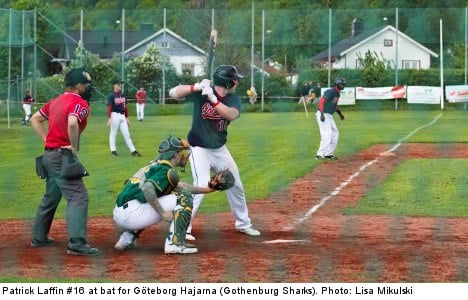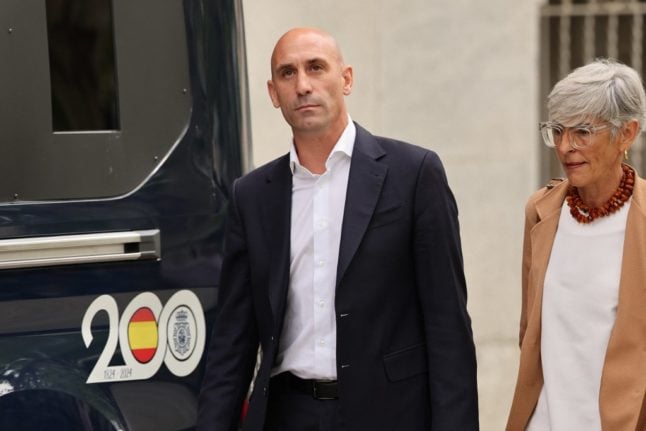There is something magical about sitting in a baseball park on a summer afternoon with friends, a beer, and a hot dog, wiling away an afternoon in the sunshine.
“I think people here will really enjoy the relaxed atmosphere that can be found at a ball park,” American Patrick Laffin tells The Local.
Laffin is one of two bona fide baseball players from the US who have recently joined the Gothenburg Sharks (Göteborg Hajarna), a baseball club whose players have been rounding the bases in Sweden’s second-largest city since 1991.
And with two new players from the US now in the line-up, the rest of the Sharks are hoping to bring the game to new heights and expand the growing number of baseball fans excited about paying a visit to the ballpark to learn about the game and the culture around it.
While explanation of the fundamentals of the game is simple (much like hockey or football), it is the complexity and the challenge of the task at hand that makes the game compelling for the players and the fans. For this reason, each year, the Sharks bring over two players from the United States. American talent helps strengthen the Swedish team’s skills and develops knowledge of the game for everyone.
IN PICTURES: See Lisa Mikulski’s images from a Gothenburg Sharks match
Promoting baseball in Sweden is something of an uphill battle, but the country’s long summer nights can be an asset. The Swedish Baseball and Softball Federation (Svenska Baseboll och Softbollförbundet) admits as much in quoting Josh Chetwynd’s book Baseball in Europe.
“Scandinavians love sports. So while ice hockey reigns supreme – which is unsurprising in a country where very little (sun) shines in the winter – even baseball benefits by this emphasis on athletics. In the summer months, the sun practically never sets on the game of baseball in Sweden,” he writes.
While perhaps unknown to many Swedes, the federation has actually been around for more than 50 years, having been founded on March 25th, 1956. Sweden’s top national baseball league boasts six teams, including the Sharks, while an additional 40 clubs battle in a regional series.
Laffin, an outfielder from Boston who played college baseball in North Carolina, played a year of semi-professional baseball in the US before putting the word out last autumn that he was interested in playing baseball in Europe. He eventually made contact with the Gothenburg club that wanted to bring him to Sweden, not only to play, but to help the sport grow. After arriving in Sweden in April, Laffin was immediately struck by the level of enthusiasm among members of the Gothenburg club.
“I became very impressed with the amount of passion and love they had for the game,” he explains.
“They had incredible goals and an amazing desire to help the sport they love so much grow within Sweden.”
So Laffin, along with American teammate Branden Roper-Hubbert, signed contracts with the Sharks, and in so doing made a commitment to spread the baseball love around Sweden. Roper-Hubbert, from Atlanta, serves as this year’s team captain.
“This is a bunch of really dedicated individuals who love baseball. And they would be happy if the community would grow to love it as much they do,” he says.
The Sharks play every Saturday either in Gothenburg or away. The home field is at Shark Park but the away games take their toll on the players. Often traveling six or more hours to get to various fields around the country, most of the money for travel and overnight stay comes directly out of the players’ pockets.
“I have been blown away by the enthusiasm of the people on the team. It is not easy playing a sport that no one knows about but these individuals go out of their way to play and promote the game,” says Laffin, who nonetheless admits he was at first hesitant about coming to Sweden.
“But playing with these guys has given me back the joy I once associated with the game. In the process, I have fallen in love with a country and it’s people.”
The Sharks continue to build an audience in Gothenburg, but challenges remain.
“Our field is really not very good,” explains Vice Chairman and General Manager Johan Weidolf.
“It often floods and we are always battling the grounds.”
According to the players and groundskeepers, approximately 200 hours have been invested in field maintenance and upkeep this season. Even the players themselves must serve as part-time groundskeepers. While the team has some sponsors, help from the city has been hard to come by.
“It’s tough because when we go to other fields, such as Stockholm, their fields and teams are supported by the city,” explains Weidolf.
“Their fields are very nice.”
Shark club chairwoman Maria Jönsson adds that much of the work is a labour of love on the part of players and others associated with the club, all of whom are committed to helping baseball grow in Sweden.
“No one here gets paid to do this. It’s all volunteer work,” she tells The Local.
“We have some sponsors, like those who donated our speakers. And also the sponsor who designed and printed our season programs. The best thing would be to have a field of our own,” she adds.
“It shows pride in a team.”
The team shares Shark Park field with the Sharks American football team. At the start and end of each game, the baseball players must put up and take down the fences to make way for those playing another American sports import. However, there are hopes that the Sharks will have their own field of dreams to call home next year.
“Another great thing would be to get our softball team going again,” Jönsson continues. “Right now we are starting from the ground up. The number of our teams is definitely down from what it was twenty years ago.”
With so much time spent playing the game, practicing, maintaining the field, and traveling, the Gothenburg Sharks still find time to reach out to the community, with their newly-arrived American imports playing a leading role.
“This year our main focus in on the kids,” says Weidolf.
“Patrick and Branden are great at going to the schools. They explain the sport of baseball and teach the kids the rules of the the game.”
Laffin is no stranger to working with children, including special needs children, with his efforts being featured on an a programme by the TV channel HBO. He explains that some of his most memorable moments have been spent with the ‘Big-Brother’ organization in Boston.
And with the Swedish baseball season well underway, he still manages to go out to schools and universities about three to four times a week to preach the gospel of baseball and try to connect with youngsters in Gothenburg.
“It has been a great pleasure to get to know these kids and helping them understand a game that has meant so much to me,” says Laffin.
Lisa Mikulski



 Please whitelist us to continue reading.
Please whitelist us to continue reading.
Member comments